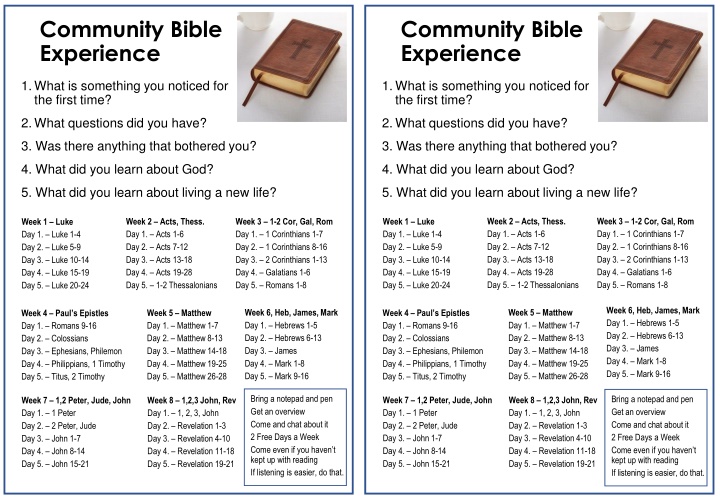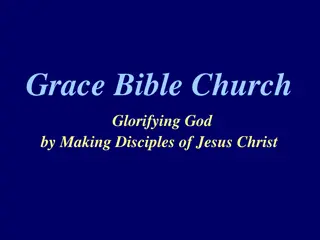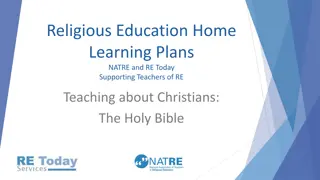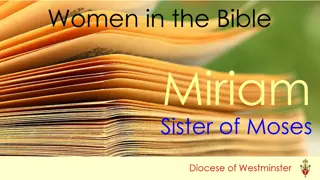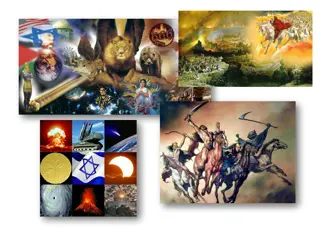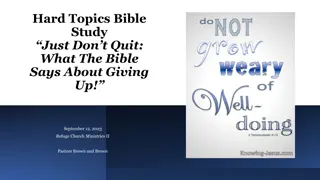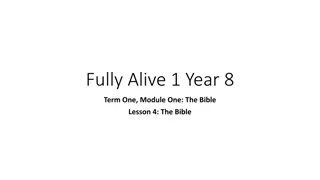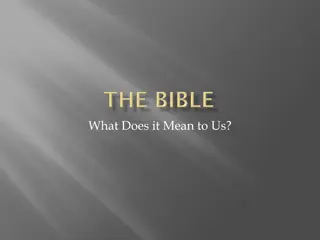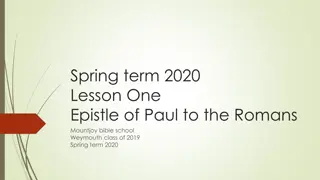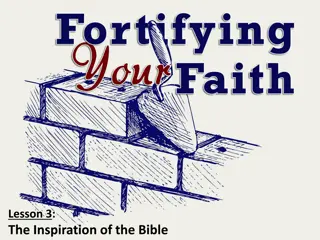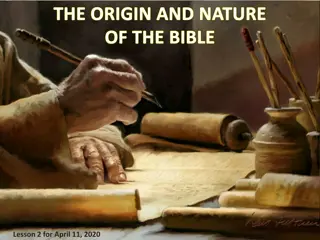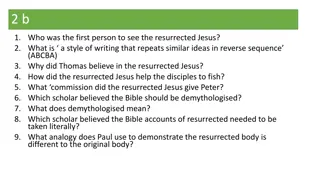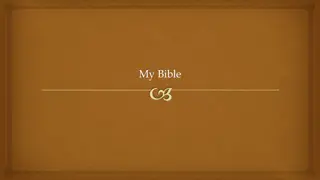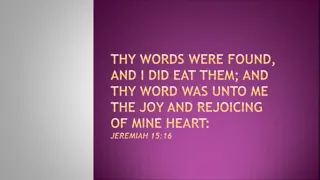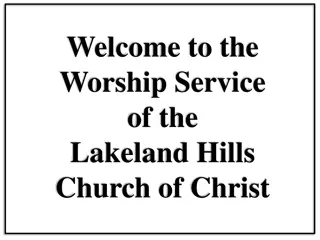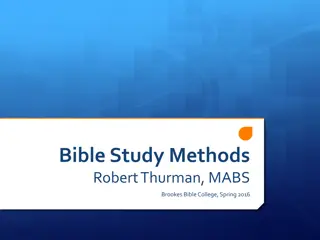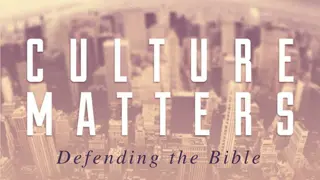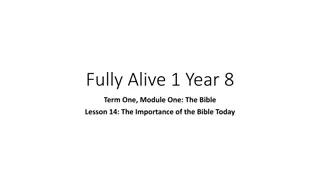Community Bible Experience Overview
The book of Luke and Acts are two volumes of history written by Luke, focusing on the Gospel and Paul's journeys. Paul supports churches through letters, including 1 and 2 Thessalonians. These letters address challenges and encourage faith amidst opposition.
Download Presentation

Please find below an Image/Link to download the presentation.
The content on the website is provided AS IS for your information and personal use only. It may not be sold, licensed, or shared on other websites without obtaining consent from the author.If you encounter any issues during the download, it is possible that the publisher has removed the file from their server.
You are allowed to download the files provided on this website for personal or commercial use, subject to the condition that they are used lawfully. All files are the property of their respective owners.
The content on the website is provided AS IS for your information and personal use only. It may not be sold, licensed, or shared on other websites without obtaining consent from the author.
E N D
Presentation Transcript
Community Bible Experience Community Bible Experience 1.What is something you noticed for the first time? 1.What is something you noticed for the first time? 2.What questions did you have? 2.What questions did you have? 3. Was there anything that bothered you? 3. Was there anything that bothered you? 4. What did you learn about God? 4. What did you learn about God? 5. What did you learn about living a new life? 5. What did you learn about living a new life? Week 2 Acts, Thess. Day 1. Acts 1-6 Day 2. Acts 7-12 Day 3. Acts 13-18 Day 4. Acts 19-28 Day 5. 1-2 Thessalonians Week 3 1-2 Cor, Gal, Rom Day 1. 1 Corinthians 1-7 Day 2. 1 Corinthians 8-16 Day 3. 2 Corinthians 1-13 Day 4. Galatians 1-6 Day 5. Romans 1-8 Week 2 Acts, Thess. Day 1. Acts 1-6 Day 2. Acts 7-12 Day 3. Acts 13-18 Day 4. Acts 19-28 Day 5. 1-2 Thessalonians Week 3 1-2 Cor, Gal, Rom Day 1. 1 Corinthians 1-7 Day 2. 1 Corinthians 8-16 Day 3. 2 Corinthians 1-13 Day 4. Galatians 1-6 Day 5. Romans 1-8 Week 1 Luke Day 1. Luke 1-4 Day 2. Luke 5-9 Day 3. Luke 10-14 Day 4. Luke 15-19 Day 5. Luke 20-24 Week 1 Luke Day 1. Luke 1-4 Day 2. Luke 5-9 Day 3. Luke 10-14 Day 4. Luke 15-19 Day 5. Luke 20-24 Week 6, Heb, James, Mark Day 1. Hebrews 1-5 Day 2. Hebrews 6-13 Day 3. James Day 4. Mark 1-8 Day 5. Mark 9-16 Week 6, Heb, James, Mark Day 1. Hebrews 1-5 Day 2. Hebrews 6-13 Day 3. James Day 4. Mark 1-8 Day 5. Mark 9-16 Week 5 Matthew Day 1. Matthew 1-7 Day 2. Matthew 8-13 Day 3. Matthew 14-18 Day 4. Matthew 19-25 Day 5. Matthew 26-28 Week 5 Matthew Day 1. Matthew 1-7 Day 2. Matthew 8-13 Day 3. Matthew 14-18 Day 4. Matthew 19-25 Day 5. Matthew 26-28 Week 4 Paul s Epistles Day 1. Romans 9-16 Day 2. Colossians Day 3. Ephesians, Philemon Day 4. Philippians, 1 Timothy Day 5. Titus, 2 Timothy Week 4 Paul s Epistles Day 1. Romans 9-16 Day 2. Colossians Day 3. Ephesians, Philemon Day 4. Philippians, 1 Timothy Day 5. Titus, 2 Timothy Bring a notepad and pen Get an overview Come and chat about it 2 Free Days a Week Come even if you haven t kept up with reading If listening is easier, do that. Bring a notepad and pen Get an overview Come and chat about it 2 Free Days a Week Come even if you haven t kept up with reading If listening is easier, do that. Week 7 1,2 Peter, Jude, John Day 1. 1 Peter Day 2. 2 Peter, Jude Day 3. John 1-7 Day 4. John 8-14 Day 5. John 15-21 Week 8 1,2,3 John, Rev Day 1. 1, 2, 3, John Day 2. Revelation 1-3 Day 3. Revelation 4-10 Day 4. Revelation 11-18 Day 5. Revelation 19-21 Week 7 1,2 Peter, Jude, John Day 1. 1 Peter Day 2. 2 Peter, Jude Day 3. John 1-7 Day 4. John 8-14 Day 5. John 15-21 Week 8 1,2,3 John, Rev Day 1. 1, 2, 3, John Day 2. Revelation 1-3 Day 3. Revelation 4-10 Day 4. Revelation 11-18 Day 5. Revelation 19-21
Community Bible Experience Community Bible Experience Week 1. The book of Luke. Week 2. Acts, 1 2 Thessalonians The books of Luke and Acts (short for the Acts of the Apostles) are actually two volumes of a history written by Luke. Luke wrote a second volume of history telling how the Gospel advanced around the world. After introducing the church in Jerusalem, structured around Peter and John Luke goes on to focus on the work of Paul bringing the Gospel to Europe. Luke tells of Paul s three journeys, each one reaching further than before. Paul spends days, weeks, months and years in different cities and Luke, alongside others, joins him on some of these journeys. After this Paul returns to Jerusalem, knowing full well that the Jews there would cause great problems for him. As they arrest him and abuse him he claims the right as a Roman citizen to appeal to Caesar. This affords him the opportunity to go to Rome and spend some considerable time there, under house arrest, but sharing the Gospel far and wide. Paul has established a church in every town that he preached in and writes them letters of support as they continue to follow Jesus while he is away. These letters include advice, rebukes, encouragement and so much more, We will read these letters, beginning with 1 and 2 Thessalonians. Paul had established a church in Thessalonica on his journeys and after he had been they faced a lot of challenges and opposition. He writes to encourage them to stay strong and say how pleased he was with their faith. Not long later he needs to write to them again because some people came to the church and suggested that Jesus had already returned. Some thought that they had missed it, others thought that heaven was the life they were living now (which didn t seem great). Paul contests that teaching and reminds them of God s bigger plan. Luke had trained as a Doctor but was writing a detailed account of all that happened in Israel at the time for Theophilus. Theophilus was obviously sponsoring the work and was likely a Roman Official of some note (Luke refers to him as most excellent Theophilus). In the first of the two volumes Luke first describes the life and death of Jesus. The second goes on to tell how the Holy Spirit and the first disciples go on to spread the Gospel around the world. Luke is explaining firstly that all of the happenings were already part of God s great plan, not some change to it. He frequently quotes the Old Testament to show that Jesus is the fulfilment of all the promises of the Messiah. He then goes on to explain that through what Jesus did He included all men in the plan not just the Jews. This is very significant for Theophilus and for us. The birth of Jesus fulfils many prophecies. The miracles of Jesus show that He is like no other. The teaching of Jesus explain the much bigger plan that God had than the Jews ever expected. The death and resurrection of Jesus change everything. As a friend of Paul s Luke had access to much that was going on in the early church and travelled with him on his journeys. He also seems to have talked to Mary and other disciples as he gathered detailed information for his accounts. He knew these accounts would be preserved and passed on to many, especially those who had no Jewish roots.
Community Bible Experience Community Bible Experience Week 3. 1&2 Cor, Galatians, Rom. Week 4. Paul s Epistles As Paul moved across Europe spreading the Gospel he established churches in each town. Each City had its own issues and opportunities. Paul wrote to churches in Colossae, Philippi and Ephesus as well. These were churches he established and was deeply fond of. These letters in particular focus on the transformation for those who are in Christ. He establishes the changes that this takes and then goes on to talk about living out the resulting life as one transformed. This is evidenced most in Ephesians which often people split in two; who we are and how we behave. In addition we will read the personal letters of Paul to those younger men he had trained to leave as pastors in the churches he had established. Paul has spent much time in personal discipleship with Timothy and Titus and leaves them in service of their local churches. In that role he gives a lot of advice on what to do and how to avoid the difficult obstructions people put in place of the Gospel. The church often faces the same issues today. To guide them he gives a number of trustworthy sayings and some advice from a senior pastor to show where emphasis should be placed and encourages them that they are in the right place as God would have them. Some suggest that these letters couldn t have been written by Paul because their style is different to the other letters. However Paul wrote them many years later, in a personal context not a corporate one and from Rome, not in the middle of his journeys, having had years in prison in Jerusalem, Caesarea and Rome. His style is bound to be different. Paul s concern is that they continue to pass on the truth carefully and that means there is more of a focus on discipleship. These letters would also have been passed around churches. Corinth was a rich city, but full of sexual promiscuity. Galatia is a region which includes Lystra and Derbe and is in modern day Turkey. While there he taught often in the Synagogues so a lot of his discussion was with converted Jews. His letters reflect the issues of the churches he writes to, with 1 and 2 Corinthians he challenges their loose moral code, where they thought everything is permissible for me. In Galatians he challenges their lack of freedom in Christ. Rome was not a church he had established and he writes to them on the way there. He tries to establish a shared understanding of the Gospel as a whole so that when he comes they will welcome him and partner with him in outreach. Paul evidently cares deeply about each church, each person in them, their faith, how people have tried to mislead them and how they are continuing in the Gospel. We too learn from his correction, hopes and guidance.
Community Bible Experience Community Bible Experience Week 5. Matthew Week 6. Hebrews, James, Mark The Gospel of Matthew is an eye-witness account of the life of Jesus similar to the one we recently read by Luke. Matthew though, saw these events first hand, having been one of the disciples. Matthew was also called Levi and had a strong Jewish heritage but he calls himself Matthew, the tax collector a number of times in recognition of where Jesus brought him from. As a tax collector he would have been educated (more than Peter or John) but probably wasn t very moral and had a poor reputation because he worked with the Romans. His Gospel was written more to the Jewish communities throughout the world. He very much connects his stories of Jesus with the Old Testament. The Genealogy at the start, for example, traces Jesus ancestry back through Jewish roots to Abraham. In particular he shows again and again how Jesus fulfils all the promises of the Old Testament, proving He is the Messiah and more, the one sent by God to be Immanuel (God with us). He therefore ensures that the reader sees the continuation of God s plan from Old Testament to new, not a different plan completely. Having walked with Jesus he tells stories of what he said, quoting the sermon on the Mount, for example, in more detail than Luke. It may have been that he sat taking notes of all the sermons and parables Jesus told. He also gives detailed accounts of miracles and events in Jesus life. He emphasises the coming kingdom as the fulfilment of all Jesus had come to do and that kingdom theme is throughout it, even in the prophecy of the end times. His emphasis on parables and teaching then show what the new kingdom will be like in Christ. Following Matthew there is more writing that follows on from the Old Testament and how Jesus is fulfilling all the Old Testament promises. Firstly there is Hebrews. The writer, although unknown, is obviously a Christian with Jewish heritage writing to Jewish brothers and sisters. He is reminding them how much more Jesus is than the old law, promises, and prophecies and how He fulfils them and replaces them with a new covenant. Hebrews shows the fulfilment of Scriptures, the prophecies that point to Jesus and how the Old Testament heroes were not commended for their Jewish heritage or their works but their faith. Just like the new believers what got them through was their trust in a powerful God and in Jesus this God comes closer and more real to our lives. Along with that James says that in trusting God we don t do nothing, our real faith is matched by action, by living out our hope and by prayer and life together that shows who we trust. James was the brother of Jesus and saw so much more than others. He was not one of the 12 but was one of the leaders in the church in Jerusalem as they scattered and spread the Gospel. He saw Jesus live differently and faith in Him should also be met with real action. Some of the Jewish believers had been accused of letting people away with anything and James affirms this is not the case, faith is shown in action. Finally Mark s Gospel is a shorter summary of Jesus life. It is a simple Gospel with no Genealogy and less attacks on the Pharisees because it was meant for Gentile readers. For the same reason his proofs of the deity of Jesus depend less on the fulfilment of prophecies and more on miracles.
Community Bible Experience Community Bible Experience Week 8. 1,2,3 John and Revelation Week 7. Peter, Jude, John s Gospel Peter writes 2 letters to believers scattered around the world to encourage them. The letters are to give them hope and confidence in their faith. Like Mark s Gospel, which we just read, Peter recognises that Gentiles spread everywhere might feel inferior and so he writes to encourage them that they have everything they need. In 1 Peter he points to the fact that they are a chosen people, whether wife, husband, slave or master, part of God s holy nation. In 2nd Peter he reminds them that they have everything they need and reminds them not to be distracted by those who have false motives. 2nd Peter also points to the return of Jesus, not as something God has forgotten, but as an ultimate promise we should long for. Jude, the younger half-brother of Jesus, like James calls himself a servant of Jesus and like Peter reminds us not to be caught out by false teachers. False teachers are recognised by using God s grace as an excuse for immorality (v4). The Gospel of John is different from the other Gospels. They are called synoptic Gospels, giving a synopsis of Jesus life, but John starts even before that, before He put on flesh, with His true Godliness. He gives a more intimate picture of Jesus, one where He is confident who He is and where He contends with the Pharisees and others. He doesn t just tell what Jesus did and taught, but also about who He was and in particular chapters 1 and 17 are nothing like the other Gospels. He explains his reason for writing in John 20:31. In reading John s Gospels watch out for the I Am sayings, for His deity and signs that point to that. John s Gospel also introduces us more to the Holy Spirit and what He will do when He comes on His people. As well as the Gospel we read last week John also wrote 3 letters to churches to encourage them in their faith. 1st John reminds everyone that God is light and not to hide our sin but let God forgive it. He then goes on to say what it means to be disciples, to obey and to love. It has some wonderful truths, that God is love so love is the evidence of His followers and that we are called children of God. As we follow Jesus we will stand out by our love for one another and our faithfulness to the truth. False teachers will have many ideas that stray from the faithful truth of Jesus as the Son of God. 2nd and 3rd John are short letters, written to beloved friends to encourage them not to be deceived but to continue to walk in the truth. John has no greater joy than see them walk in truth. Revelation is the most complicated book as God gives John a picture of what is to come. Firstly it begins with a vision of Jesus in His glory. Then it follows with Jesus speaking earnestly to 7 of the churches, discussing their problems and challenges and His promises for those who persevere. Then it tells of the throne of God and Jesus approaching the throne, to bring an end to time and the earth. As Revelation describes things that are to happen John is describing things he doesn t understand in pictures and metaphors that are not always clear. If we try too hard to examine them we speculate on what they might be, so we focus more on the great plan of God. After Jesus defeats His enemies there will be judgment and then heaven and the lake of fire. He describes these in some measure but not completely. God revealed to John and through John to the church that Jesus would have the final victory and that His enemies power will be overthrown.
